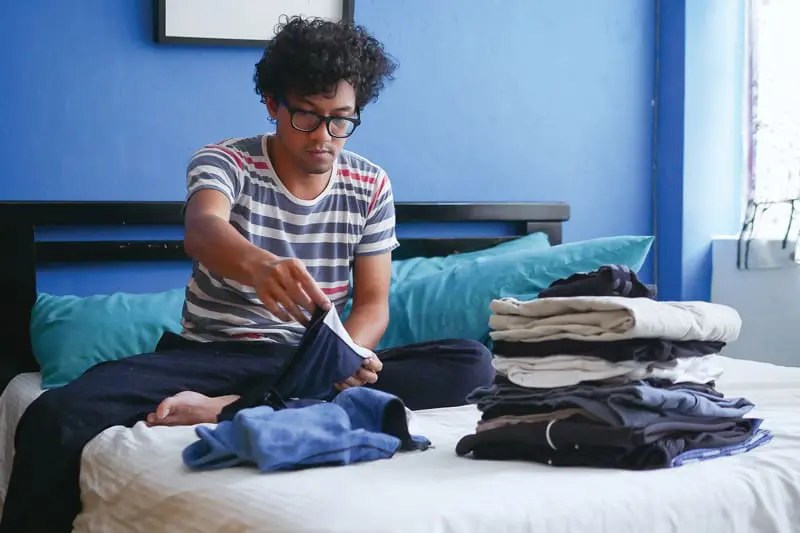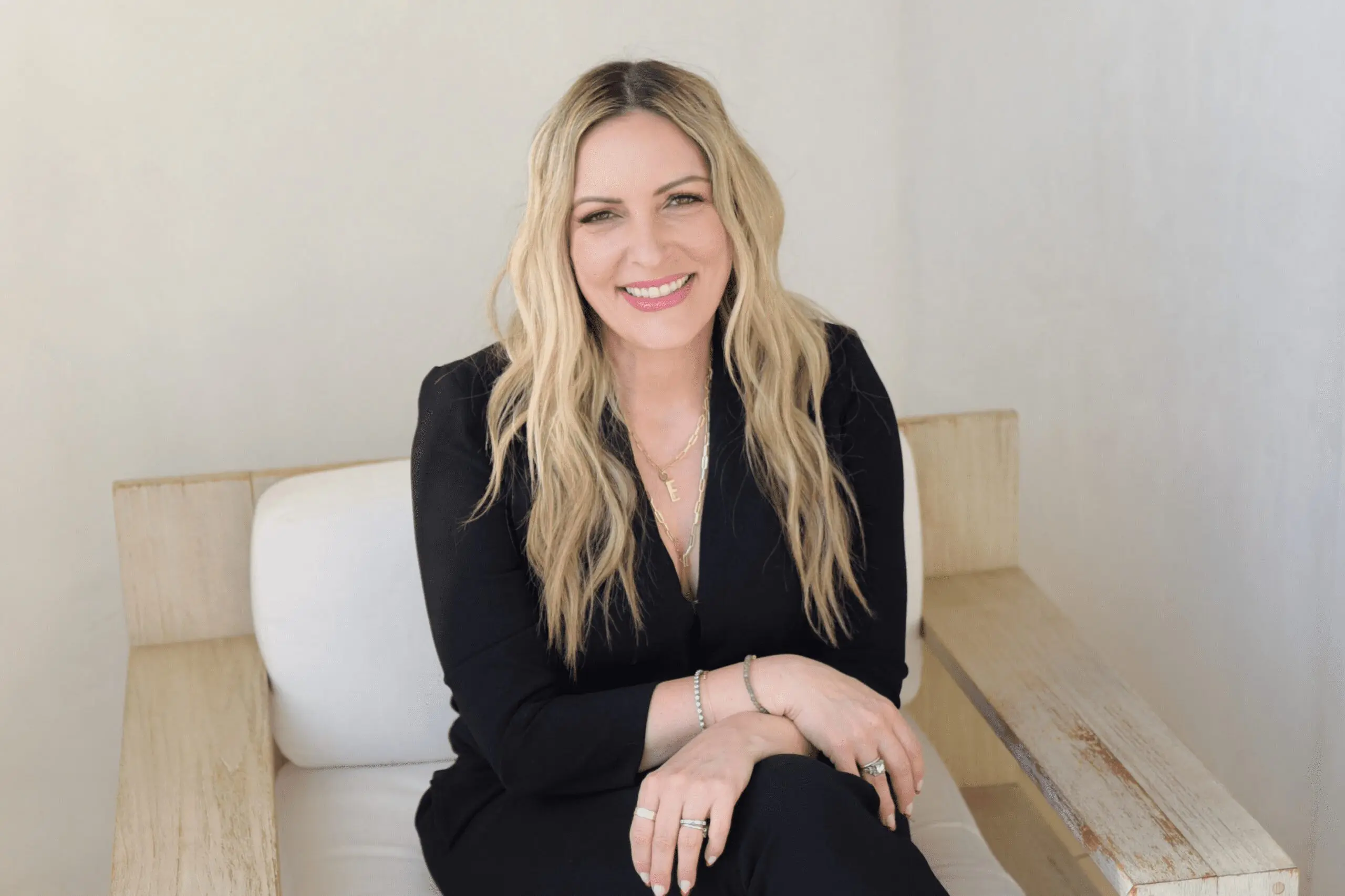It could’ve been just another harried day in a seemingly endless series of harried days for lawyer and mom Eve Rodsky. But this one was meant to be special. Rodsky, who worked in family mediation and organizational management, and her husband Seth, an investor in media and brands, had recently had a second child. She’d decided to clock out of work a few hours early and fetch her first child, Zach, from his toddler-transition program so she could take him on a little mommy–son adventure. It was only fair, she felt. After losing his top-priority, only-kid status, Zach deserved some one-on-one time with her.
Before she left the house, Rodsky handed the infant’s babysitter a page of meticulous instructions and went over them with her twice. She then grabbed the snacks she’d packed for her and Zach, along with her breast pump, a FedEx package in need of mailing, kids’ shoes that already didn’t fit and had to be returned, and a random bag that one of Zach’s playmates had left behind that she knew no one else would deal with. With a couple of free fingers, she managed to clutch a client contract she had to mark up before the next morning’s meeting.
Once on the road, she’d only been gone a few minutes when her phone buzzed with an incoming text. It was Seth. His message? “I’m surprised you didn’t get blueberries.”
By her own account, Rodsky lost it at that moment. In fact, she started sobbing so hard that she had to pull the car over. But it wasn’t anger fueling this reaction to Seth’s text: it was self-recrimination. I used to manage a team of employees, she thought, and I can’t even manage a grocery list?
Then a new thought barreled in: When did I become the default for every household task? Why can’t my able-bodied, successful, intelligent husband get his own damn blueberries? Why, on top of everything else, am I responsible for his smoothie needs?
As she wept, Rodsky felt so bereft that she wondered if those damn blueberries might end her marriage. Was she going to have to add getting a divorce to the endless list of things she already had to do?
Domestic Inequality and Invisible Work
Women’s lives have been on an upward trajectory in the U.S. We’ve put major cracks in the glass ceiling. We’re better paid than we’ve ever been, and we’ve earned millions more college degrees than men since the 1980s. According to LinkedIn, though recruiters will still open more job applications from men than women, once they do look at a woman’s application, she’s likelier to get hired. Despite the recent winnowing of our reproductive rights, the message that’s permeated our culture for years has been that the only true limits on women’s achievements and happiness are now self-imposed.
And yet, in the last two decades, American women, even those who acknowledge the bevy of opportunities stretching out in front of them, have been reporting a sizable dip in happiness. For Rodsky, that dip is closely tied to a message she received early in life: that even women with demanding, full-time careers will still be responsible for most of the domestic work in a household—and that job is boundless.
Sure, there are the large, obvious tasks of paying for and keeping up a house, but what too often gets overlooked is the mental load of always having to be on top of each shifting detail informing the ecosystem of family life. In straight couples, men might step in when it’s time for the execution of a task but often haven’t been there for its conception. So, yes, dad might drive Juju to her practice, but did he also order her uniform, scour the house for her lost water bottle, sign on to the team’s scheduling app and cross reference it with the family calendar, remember the snacks and that they’re also driving her friend to practice that day? To be a master of mental load is to never allow ourselves to forget a single aspect of what we’ll need on hand to be prepared for an upcoming task; always to know when a household is running out of what things; to keep in mind how long in advance to book appointments; to prepare for commitments made to family, friends, schools, and kids’ countless activities and needs; and many, many other things that Rodsky classifies as unpaid care-based labor.

We know from recent research that women do two-thirds of what it takes to run a home and a family, regardless of whether they work outside the home, or in many cases, earn the larger income—having huge impacts on mental and physical health, employment, and life and relationship satisfaction. But lest we assume that the dynamic of one person taking on a larger mental load in families only affects traditional, American heteronormative couples, Rodsky, who’s been researching couples in 17 countries, has found that it affects progressive and LGBTQ+ couples too, as well as couples from a myriad of cultural backgrounds. In fact, this is such a pervasive and recognizable reality that her Fair Play book, published by Reese Witherspoon’s Hello Sunshine company, became a New York Times bestseller, and its accompanying card deck, which helps couples divvy up the load more fairly, has been outpacing the sales of Pokémon cards.
Rodsky’s been a guest at Google, featured on all the big network morning shows and NPR, and is the subject of a documentary by Jennifer Siebel Newsom, which, along with profiling Rodsky and couples using Fair Play, features conversations with Melinda Gates and U.S. Representative Katie Porter. The film shows couples navigating the prospect of achieving real equality in the home and gives voice to both partners. One of its taglines is “For women to step into their full power in the world, it requires men to step into their full power in the home.”
These days, Rodsky’s fronting a full-on movement, supported by her research showing that the unquestioned taking on of minutiae by women in families is sidelining their sense of fulfillment as well as their mental and physical health. It may be the unsexy part of addressing equality—who wants to think about household chores, or think about thinking about chores?—but as therapists know, it matters deeply to the people who are shouldering them.
According to research published by the American Sociological Association, nearly 70 percent of divorces are initiated by women. About a million U.S. couples divorce each year, and a key study by Michael Rosenfeld notes that “marriages in which the wife felt they were doing more than their share of the housework were especially likely to end in divorce.” He goes on to state, “The slow pace of gender role change within heterosexual marriage is one key reason why the feminist revolution is seen as an unfinished, or stalled revolution.”
Indeed, when we look beyond the shiny veneer of the progressive, two-career household, we find that especially among straight couples, women are often not just bringing in their own money, they’re doing more of the domestic work before and after their jobs and more of the emotional labor of the family, being the fallback for things like remembering relatives’ birthdays, teacher-appreciation days, and the fact that the dish soap needs replacing before it runs out.
The reality for many women—that their partners seem to rarely appreciate, or offer to shoulder, some of these tasks—can make it that much more taxing on them as the default (or as Rodsky calls them, “she-fault”) parents.
The Mental Load Is Too Heavy
Does this seem like unfair partner bashing, or a vestige of the 1950s, when women didn’t work outside the home much and were denied a multitude of paths to self-fulfillment? Well, after the blueberry incident, Rodsky started asking her female parent friends and colleagues to list all the underappreciated, invisible work they do. A text chain ballooned into a “Shit I Do” list. It included things women rarely kvetch about because they seem so mundane, but that require a significant mental load. Reducing this load would require a partner to, say, not just drop off some muffins at the school’s bake sale, but add the bake sale to his calendar; do his part as a member of the bake-sale team to send out a reminder to his child’s classroom email list about the event; find a muffin recipe and buy ingredients early enough to be sure the store has everything he’ll need to be able to cook, cool, and package the muffins the night before the sale; take time out of work to not just hand off the muffins to the person who organized the sale, but stand at the table with the other baking parents, making nice and making change until the end of the sale; then help with cleanup; and finally, catch up on work emails after everyone in the house is asleep at night.
Because the husband who gives 100 percent of his mental energy to the bake sale is such an outlier, Rodsky believes that straight men aren’t wrestling with the same existential sense of an ever-draining, low-level pressure that straight women are, even in our forward-thinking Western society. Modern mothers may want to clap back at the pressures they’re still under in a postfeminist world, but of course, it’s not easy. To do so is to invite role-failure ramifications upon ourselves. After all, what kind of mom stops at 7-Eleven right before the morning school bell to grab Oreos, a box of Cheez-Its, and the one remaining apple there for her kid’s lunch? Or leaves Grandma Maria with an empty mailbox on her 80th birthday? One that’s not willing to carry her outsized share of mental load, clearly. Reimagine this scenario with a dad in the driver’s seat, however, and do you feel the judgment begin to fade? Kudos to him—he got Junior some calories. Who cares where they came from?!
The “Shit I Do” list felt like a revelation to Rodsky. Seeing it all laid out, she theorized, would cause an awakening in any non-Neanderthal partner. How could it not? But when she forwarded the list to Seth, he didn’t come to her ruing the lack of equality in their house and pleading for opportunities to step up. He sent back an emoji of a monkey covering his eyes.
With impressive restraint, Rodsky took a breath and drew from her professional experience in organizational management. Absorbing Seth’s feedback, and reasoning that if the shit-list was going to be overwhelming to her partner, it would likely garner the same reaction from other partners, she knew a modification was in order.
Her next step was to design a system, which she called Fair Play, whereby couples can engage with dividing tasks up like they were cards to be held and played. It’d be a kind of ongoing, good-natured game: a practice in fairness, where holding and playing a task card means owning that task from the very beginning—including conceptualization, planning, and timing—through to its execution.
She posited that if partners could divide up tasks in this soup-to-nuts way, neither one would need to hold any of the prep work or mental load for a task that wasn’t theirs. Jimmy wouldn’t just take Arya to her softball games on Wednesdays: he’d get on the coach’s app and learn the practice schedule, make sure the emergency forms were signed, and plan the out-of-town game commutes and snacks. But importantly, Rodsky further specified, his partner, Seema, couldn’t nag him along the way to complete these tasks. Softball games are, after all, his card to hold.
Rodsky added another caveat. If the task turns out to be too onerous, Seema and Jimmy, during periodic check-ins, could agree to trade their tasks back in and take a different card for a while.
Let’s consider the case of Charise, a friend of mine who was serendipitously reading Fair Play and using the card deck when I started working on this story. She’d gotten a new job recently, and had been doing much more driving, now that she was working in an office outside the city. Instead of nagging her partner, Jerome, when the brakes feel scrapy or the oil is low, car maintenance is now one of her Fair Play cards. For his part, Jerome, who’s working from home, has agreed to take on doctors’ appointments for a while—which means understanding when his three kids’ physical exams need to be completed so as to not draw the ire of the school district, getting all the necessary paperwork in order, scheduling the appointments, alerting the kids’ teachers when they’ll need to be pulled from class to make it to them, and being the one to take time off and ferry the kids across town to the pediatrician. Once there, it means listening to the doctor’s feedback, making note of any suggested treatments or follow-up appointments, and remembering to ask for the signed form at the end of the appointment to take back to the kids’ school.
Jerome will also pick up any medications, deal with the insurance to get them covered, and make any follow-up appointments suggested by the doctor. He’ll add these appointments to the family calendar, and scan and email the filled-out forms to the school administration website. Charise no longer needs to carry a scintilla of the mental load of doctors’ appointments for the kids, and Jerome can enjoy the ride when he’s behind the wheel of their car.

The rules of Fair Play specify that the two of them can decide whether they’d like to trade these cards in for different ones, but what happens if someone feels that not holding a certain card is stressful? What if Jerome, stressed by the idea that his wife might end up stranded on the side of the road during her commute, has less tolerance for low tire pressure than Charise? Or Charise, who grew up in a family that was always on a tight budget, thinks Jerome should be shopping around more carefully for the nutritional shake their GP suggested they find for their too-skinny pubescent son?
Trusting our partners and allowing them to own a task can be a relief. But differences in expectations that we don’t always know we carry can create serious relational rifts.
Inherited Expectations
Rodsky believes our expectations around household responsibilities and standards of care settle deep within us in childhood. She learned in law school that communities form agreed-upon values and traditions, which translate into standards that become expectations of behavior and eventually hard and fast laws. Families are no different.
For example, I grew up in a household of runners. My mother had rules against sweets that were so stringent my father would hide a liter of Coca-Cola under his driver’s seat and chug from it on unnecessary drives through town. My partner’s family, conversely, subsisted on bags of mini Hershey bars, tortilla chips, and the occasional fried egg. Vegetables and fruit made an appearance only when guests came over, and even then, in the form of a round of prechopped broccoli and cauliflower in a plastic container from the grocery-store deli.
When it came time to feed our own kids, shopping together was an exercise in mutual disdain. I was admittedly uptight about what we were putting in their little bodies. I wanted legumes that could become healthy soups, bags of salt-free nuts for protein snacks, eggs we could boil and take with us on our excursions so we wouldn’t have to buy candy bars for sustenance. He wanted microwavable fried chicken, packaged salami slices, and tubs of ice cream. He told me I was exhaustingly uptight. I told him he was shirking his responsibilities to his progeny and dooming them to early-onset diabetes.
I remember thinking at the time that this was gendered. As a mom, I needed to keep these kids alive. As a dad, he wanted to show his boys their birthright: an on-the-fly and yummy good time.
Interviewing heterosexual couples using Fair Play, Rodsky found that men often complain that their partners are perfectionists, while women find men’s standards too low. But when couples are asked about specific standards of care for many tasks, they’re often chuffed to discover they share similar basic standards for most things. Houses should stay clean. Children should be fed a healthy diet (ahem). Appointments should be kept. Nights out for either or both adults should be on the table. Even what Rodsky refers to as unicorn space—unadulterated time that a partner can have to pursue her dreams outside the family—should be honored and protected.
When confronting differences in how to maintain these basic standards, Fair Play encourages couples to explore what the task at hand is bringing up for them at scheduled weekly check-ins. For example, Rodsky and her husband had a lot to bring to their check-in after agreeing he’d be responsible for the trash. He’d had to line the bins, keep an eye on and gather garbage bags from all the baskets in the house, and take the trash outside in time for collection each week. But while he held this garbage card, Rodsky found that she’d walk into the kitchen in the morning and time and again the garbage would be so full that trash was spilling onto the floor. She broke a Fair Play rule and nagged him; he told her that her expectations were unreasonable; she passive-aggressively left new garbage bags out on the counter alongside the coffeemaker where his morning brew was steaming; he swore at her under his breath as he dragged out the trash before he thought any reasonable human being should have to.
When they checked in, they dug deeper into why this discrepancy about garbage was such a lightning rod. She told me, “I had to say to Seth, ‘Look, we’re fundamentally misaligned over garbage. I think about the cockroaches and water bugs in my house growing up, and the sticky floor and living in a tenement. Instead of the banana peel that’s still out from the smoothie you made, I see me as a 12-year-old taking care of a disabled nine-year-old brother alone at night because our mother was working late, trying to get her tenure at the Hunter School of Social Work, where they gave her night classes because she was a woman, and women got the shit classes. I’d put my brother to bed and he’d ask for water, and I’d have to go to the kitchen and close my eyes and wait for the water bugs and the cockroaches to scatter before I could get the water.’
She says Seth was then able to say, ‘Well, I had a housekeeper growing up, so I never even thought about garbage. And I slept on Domino’s pizza boxes and lived with a dead cat in my fraternity, so I don’t really give a shit, apparently, about garbage. But I get now why you do, and it’s not going to be everything you want, but I can take it out once a day because now I know how much this matters to you.’
That was really big for us. It didn’t have to come down to, ‘I care about it more, so I have to do it.’”
Fair Play in Therapy
If these sound like the kinds of conversations that are ripe for unpacking in a therapist’s office, Rodsky agrees.
“I started to peel back layers and think, ‘Wow, this isn’t about the trash or whether we’re having blueberries in our smoothie,’” she says. “’This is really about the person who I thought loves me the most in the world not valuing my time as equal to his, and that scares me.’ It’s almost too hard to bear, because how do you move forward when you know that? That’s why we need the intermediaries, mental health professionals who can take that learning and help us use it in a healthy way to rebuild a more solid foundation for relationships.”
To this end, Rodsky has established a research and practice arm of Fair Play. Research psychologists, LCSWs, and therapists have helped her refine her understanding of household dynamics and how her Fair Play system can shift them. She now offers training and facilitator certification in Fair Play. Participants learn about client resistance to establishing a fairer household, how to help them steady and deepen their relationship as they gain clarity on their unequal division of labor and begin to address it, and ways to support them as they work on their communication around these often-triggering changes.
The program dives into the research around why women do most of the unpaid labor in society, but it also contends with what she considers the most important experience of all: that of the therapists themselves. “We’ve all been brought up in a patriarchal system,” she says, “and some therapists tell me that unlearning it in their own households has been the hardest part of the work. They’ll say, ‘I had to go into this training with two hats, as a mother and as a therapist. And I’m realizing that as a therapist in private practice, I’ve succumbed to the toxic time message of ‘my job is more flexible, so I’ll design my practice around my children’s school schedule, and my partner never has to make that sacrifice.’”
Rodsky says, “Sometimes I cry thinking about all these women therapists, who give so much to help other people, admitting, ‘Well, if I’m doing that to myself and haven’t unpacked it, am I really addressing the impact of it in other women’s lives?’ They’ll often report back to us in our training surveys that it’s very triggering work.”

Rodsky is pushing the notion that even if one partner makes more at their job, both adults in the house still have limited amounts of time in the day, and that time is equal in worth. Leading up to the writing of Fair Play, she conducted a longitudinal study in consultation with Darby Saxbe, founder of the Center for the Family at the University of California and an expert in the gendered division of labor, and Alexis Jemal, a Hunter School of Social Work professor whose focus is systemic inequity, internalized oppression, and critical consciousness. Their study participants differed in education level, marital and employment status, sexuality, age, race, ethnicity, and socioeconomic status. Most were straight, but same-sex couples were included. The data she collected informed and modified the Fair Play system, including one rather painful finding: when absorbing the concept of time having equal worth, the partner making more or all of the money will often go from realizing they are undervaluing their partners’ work to wanting to outsource that work, instead of taking some of it on themselves.
Rodsky says, “The number-one toxic time message from men who identify as a working professional was, ‘If you’re so overwhelmed, just get help.’ Delegation and outsourcing became a solution that couples therapists using Fair Play were also condoning. I was starting to panic because the problem with that is that outsourcing doesn’t help with the cognitive labor: you’re just leaning back into patriarchy. Outsourcing also doesn’t help with stress. Somewhat, yes, in the short term, but it doesn’t shift long-term resentment in the couple or the health outcomes for the people carrying the heaviest loads.”
As part of her Fair Play study, Rodsky discovered that each working woman interviewed who was holding 67 or more cards (a deck comprises 102 cards) was being treated for a stress-related illness. It didn’t matter if these women had already outsourced some of these tasks. Hiring a cleaner, paying a cleaner, scheduling cleaning times, getting a new cleaner if one moved on—it all still took a toll.
“On top of that,” Rodsky says, “outsourcing seemed racist because it was basically saying, ‘Okay, well, you women can rise in your career and try to reduce the stress of your life, but don’t bother men about it. So let’s explore ways for you to use Black and Brown women, whom you’re going to underpay, to solve your problems.’
“Our society doesn’t talk about it enough, but these problems are real. People tell me all the time about how they’re seething and sort of dying inside over resentment, or having hair loss and panic attacks and other health issues from all the stress. And it gets exhibited in moments we often brush off afterward, like when my husband sent me the blueberry text and I had a breakdown in the car, or when someone is dumping wet clothes on their partner’s pillow when they forget to put them in the dryer.
“Truly, therapists are the most important piece to this whole system, because individual unlearning is the only way forward. We can have as much paternity leave as possible, but if there’s no unlearning, then we’re going to end up having men just play with their kids on paternity leave and say, ‘That was fun; I’ll go back to work.’ The unlearning is what people do when they do the hard work of therapy.
“Sadly, I’ve had people come to me and say, ‘I brought the Fair Play cards to sessions, and my therapist said we can’t use those.’ They get mistaken for a way to keep score. But if these therapists would look more deeply, they’d see that the cards are a useful tool to help couples set up boundaries, systems, and communication that can change their lives for better in the long run.
“At the end of the day, you’re the cultural warriors helping people understand that this is not just the trash or the blueberries: it’s a larger problem, worthy of solving.”
PHOTO © ISTOCK SOLSTOCK
Lauren Dockett
Lauren Dockett, MS, is the senior writer at Psychotherapy Networker. A longtime journalist, journalism lecturer, and book and magazine editor, she’s also a former caseworker taken with the complexity of mental health, who finds the ongoing evolution of the therapy field and its broadening reach an engrossing story. Prior to the Networker, she contributed to many outlets, including The Washington Post, NPR, and Salon. Her books include Facing 30, Sex Talk, and The Deepest Blue. Visit her website at laurendockett.com.













